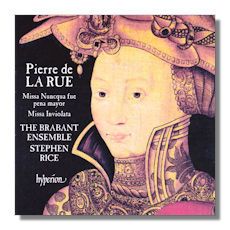
The Internet's Premier Classical Music Source
Related Links
-
La Rue Reviews
- Latest Reviews
- More Reviews
-
By Composer
-
Collections
DVD & Blu-ray
Books
Concert Reviews
Articles/Interviews
Software
Audio
Search Amazon
Recommended Links
Site News
 CD Review
CD Review
Pierre de la Rue

- Missa Nuncqua fue pena mayor
- Missa Inviolata
- Salve regina VI
- Magnificat sexti toni
The Brabant Ensemble/Stephen Rice
Hyperion CDA68150
Pierre de la Rue lived from around 1452 to 1518 and led a distinguished musical life. Much more notable, in fact, than his reputation today suggests. Aside from Josquin (an almost exact contemporary) Brumel, Gombert, de Morales and Mouton are probably better known – even if only marginally so. The approach taken by the superb Brabant Ensemble – surely now to be considered one of Britain's most accomplished and admired groups performing sacred Renaissance music – under the former choral scholar at King's College, Cambridge and now lecturer in music at Bristol University, Stephen Rice, yields nothing to this under-appreciation on a splendid new CD from Hyperion containing only one work (the Magnificat sexti toni) which is otherwise available (on Naxos 8557896). For them, this rich yet focused choral polyphony has nothing either to apologize for or any kind of case to struggle to thrust forward. The CD conveys as much confidence as tightness and verve in vocal and choral projection. It's a splendid release, and one to be snapped up immediately.
Unlike those contemporaries who looked south for patronage, de la Rue worked in the Hapsburg-Burgundian court eventually becoming rich; and famous. Although others' compositions benefitted from the invention of printing, much of de la Rue's work circulated only in manuscripts, notably the 'Alamire' corpus; and had its center of gravity in the Mass Ordinary, of which over 30 survive. In his notes for the CD's booklet Rice situates de la Rue's works in various of three periods co-inciding in part with his patron's, Duke Philip "The Fair", travels. Stylistic marks assist in dating, though remain somewhat speculative.
Of the two Masses, Nuncqua fue pena mayor ("Never was there greater pain") is strangely the more peaceful. The Ensemble invests its performance with tenderness, a projection of the personal (in experiencing grief) and some degree of hope in looking to spiritual salvation – as is evident in the beautiful and serene "Agnus Dei" [tr.5]. The Missa Inviolata has the appearance, the feeling, of restraint and distance, almost to the point of distraction. In fact, it's Rice's deep understanding of the need to balance the happiness implied by the Major mode from the plainsong on which the Mass is based with the seriousness of using such energy wisely. Typical of the Ensemble's style, the music is never left to dwell on a theme or harmony; it's always moving purposefully forward. This is surely well in keeping of how it must have been performed in de la Rue's lifetime.
Sandwiching the Masses are the wonderfully concise yet communicative Salve regina VI [tr.6], which is sung with as much gentility and appropriate attachment as befits the composer's obvious sensitivity. It's a setting which exudes sparseness, if such an oxymoron be permitted: the voices act more in separated duets, than they seek to build a wash of color. By contrast, the Magnificat sexti toni [tr.12] aims for a richer palette, as might be expected from its purpose, of admiration. It's lively and even joyful and shows the vivacity and extroversion of delivery to which the Brabant Ensemble is as capable as the restrained and solemn.
The Brabant Ensemble consists of three sopranos, four altos, three tenors and two basses who divide their contributions across the four works presented here in various ways… one of each of the sopranos, altos and tenors performs in all four works – as do both basses; others in either of the masses and either the Salve regina or Magnificat sexti toni. So over half of the singers are high voices. Rice easily elicits as much consistency as individuality and unmistakably unique complexion from the Ensemble. He also ensures that there are, if not surprises, moments of real character – often with the endings of works where one would expect unalloyed resolution and hears a strain of doubt. Yet at other times we are struck by conclusion when the way in which immediately preceding cadences have led us to expect uncertainty. Technically, of course, the Brabant Ensemble offers a pleasing (and completely appropriate) balance of spontaneity and surety. This exactness is as much in the variety of pace as in a clean yet not at all "precious" enunciation.
The acoustic of the church of St John the Baptist in Loughton in Essex suits this clarity. And at the same time it elevates the passion of this music admirably. The sound is on the dry side, but not to the music's detriment. It allows the Brabant Ensemble's lucidity of enunciation to be heard at every turning. It also aids in our corresponding appreciation of the many changes in dynamic which Rice asks of his forces… towards the middle of the "credo" in the Missa Nuncqua fue [tr.3], for instance, when it's as though the singers are personally addressing us listeners by bending towards us to augment the gently sophisticated intimacy with which their whole performance is shot through. The booklet with this CD is well up to Hyperion's usual standards and contains a useful introduction to the music by Rice himself and the texts in Latin and English. This CD is warmly recommended for lovers of the repertoire, and both new to and familiar with the output of de la Rue. The precision, energy and technical brilliance of Rice and the Brabant Ensemble rightly go a long way to nudging the composer towards the center of our attention when thinking of the generation before Palestrina and Lassus.
Copyright © 2016, Mark Sealey


















